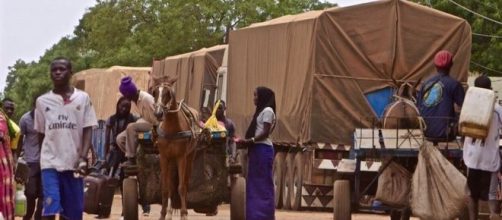The more than three-month long border stand-off between The Gambia and Senegal has finally ended as the borders open Tuesday. This is part of the commitments made by the government of Senegal after the failed May 15th negotiations with the Gambian authorities in Dakar.
End confirmed.
Confirming the end to the blockade, El Hadji Mansour Ndir of the National Transport Union said they indeed received the news late Monday evening for drivers and the transport union to lift the blockade they had imposed, a decision sparked by an increment in tariffs by Gambian authorities.
Ndir said the transport union trusts their authorities in Dakar when it comes to making decisions in the best interest of Senegal and would therefore urge commercial vehicles to end the blockage.
Negotiations.
However, consultations were not made between the Senegalese transport union and Foreign Minister Mankeur Ndiaye as earlier agreed and the union will remain vigilant and monitor the agreement between the two nations. During the recent negotiation, Senegal made an 11-point demand and key among them, the Farrafenni (Bambatenda-Yellitenda) Bridge and extradition of a Senegalese fugitive named Boy Djinneh, who escaped from Senegal prisons and now hiding in The Gambia. No agreement was reached on these points and other demands made.
Decision influenced by international community
The Gambia government was blamed for failing to provide any sufficient guarantee, willingness, and sincerity to normalize relations with Senegal pave the way to the opening of the borders. The decision by Senegal to reopen the border is believed by many as due to heavy pressure from UN, AU and ECOWAS and by some of its neighbors like Guinea-Bissau, hit hard by the blockade and Ghana, Nigeria and India whose businessmen are directly affected by the deadlock. President Macky Sall had earlier refused a mediation offer by Guinea’s Lansana Conte, who later visited The Gambia.
ECOWAS.
Dakar is also preparing to host the summit of Heads of State of the Economic Community of West African States (ECOWAS) and President Macky Sall as chair of the sub-regional bloc, who has maintained a quite diplomatic response to the impasse will make no rush on Gambia but seems ready to table the issue before West African leaders to discuss.
ECOWAS last month dismissed a petition by The Gambia to have the borders opened urging President Jammeh to uphold regional and international agreements.
Cause of the border stand-off
The border stand-off began over three months ago when Senegalese drivers decided to boycott passing through The Gambia to reach the southern Senegalese region of Casamance. The boycott came following Gambia’s President Yahya Jammeh’s unilateral decision in increasing the tariff from CFA4, 000 to CFA40, 000.
Several attempts were made at the community, transport union and diplomatic levels as well as at sub-regional bloc ECOWAS, to find a solution but all proved futile.
The transport unions and drivers in Senegal had been a stumbling block to the reopening of the border insisting that unless Gambia agrees to their demands, they will continue to detour through Tambacounda to reach the southern region of Casamance.
This has caused the Gambia’s ferry service more than GMD 25 million in revenue depletion leading President Jammeh to rescind his decision.
A concession for the venue of negotiation was one time the problem to discuss the impasse and find a lasting solution. On May 15th, Gambia agreed to send a delegation to Senegal headed by Foreign Minister Neneh MacDouall-Gaye. The talks stalled though the two delegations agreed on some points but failed to agree on what Senegal called ‘key points.’
Earlier, a joint mission by ECOWAS, African Union, and the United Nation sent to Banjul called on the two governments to ensure dialogue and reach a lasting solution to the frequent border crisis. President Yahya Jammeh has used closing the border and the building of a bridge across the River Gambia as leverage.

